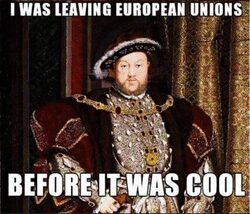-
Was Brexit really unexpected and unprecedented?
(written for a History seminar during my 1st year in the Master of English studies)
On Thursday, 23rd June, 2016, a referendum was held in the United Kingdom, as to wether it should leave the European Union or remain part of it. 51,9% of the 33,5 million voters chose to “leave”. This outcome was quite unexpected to a lot of people. Newpapers throughout the world immediately published articles heading the words 'unexpected' or 'unprecedented'.
And yet, one might wonder: was it really so unexpected? Is there really no precedent in British history? After all, Winston Churchill once said that Britain was “with Europe, but not of it. We are linked but not combined. We are interested and associated but not absorbed.”, and this quotation was (mis)used1 by the Leave side during the campaign. This shows that already in 1930 – that is, before there ever was a 'European Union' – the British – or at least their future Prime Minister – did not feel entirely part of a united Europe. Where did – or does – this feeling come from? Perhaps one may find hints or clues to this British 'peculiarity' in its history, or even in its geography. Or perhaps, on the contrary, there are some historical patterns that repeat themselves throughout world history, regardless of area and time. In the first part of this essay, I shall endeavour to analyse British geography and ancient history in the light of Karl Wittfogel's theory of margins, and try to explain how Britain came to feel being both inside and outside of Europe.
 This then leaves us with the question of a 'precedent'. It quite struck me that people found the Brexit unprecedented, while there had already been a huge breaking from the European centre in the 16th century, ie, the English Reformation under Henry VIII. This is also the opinion of Bilal Hafeez, from Nomura Bank, who wrote an article comparing the Brexit and the English Reformation in response to the numerous assertions that no precedent for Brexit could be found. This article was then used as a basis for similar articles by other newspapers, such as the Telegraph and the New-York Times. As I learnt since I was a child that we study History in order not to make the same mistakes again - or at least, to learn from the successes and failures of our ancestors - I thought that it might be interesting to look at Brexit while bearing in mind this "first Brexit". The second part of this essay will be dedicated to analysing this comparison, and trying to assess to what extend it may be relevant in order to understand the hows and the whys of the Brexit.
This then leaves us with the question of a 'precedent'. It quite struck me that people found the Brexit unprecedented, while there had already been a huge breaking from the European centre in the 16th century, ie, the English Reformation under Henry VIII. This is also the opinion of Bilal Hafeez, from Nomura Bank, who wrote an article comparing the Brexit and the English Reformation in response to the numerous assertions that no precedent for Brexit could be found. This article was then used as a basis for similar articles by other newspapers, such as the Telegraph and the New-York Times. As I learnt since I was a child that we study History in order not to make the same mistakes again - or at least, to learn from the successes and failures of our ancestors - I thought that it might be interesting to look at Brexit while bearing in mind this "first Brexit". The second part of this essay will be dedicated to analysing this comparison, and trying to assess to what extend it may be relevant in order to understand the hows and the whys of the Brexit. votre commentaire
votre commentaire Suivre le flux RSS des articles
Suivre le flux RSS des articles Suivre le flux RSS des commentaires
Suivre le flux RSS des commentaires
